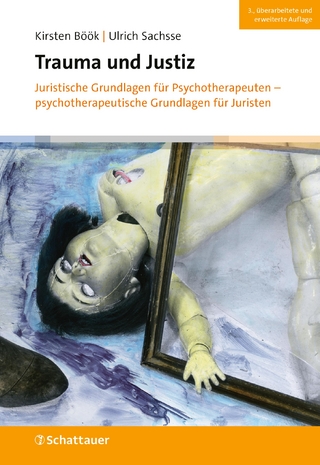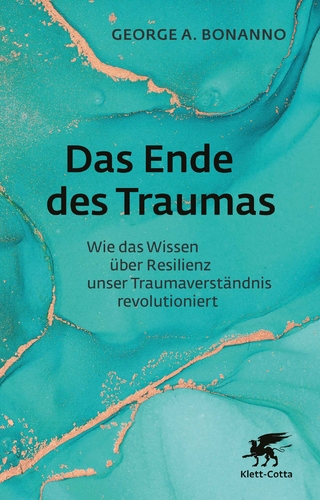
Principles of Trauma Therapy
SAGE Publications Inc (Verlag)
978-0-7619-2920-8 (ISBN)
- Titel ist leider vergriffen;
keine Neuauflage - Artikel merken
Principles of Trauma Therapy provides a creative synthesis of cognitive-behavioral, relational/psychodynamic, and psychopharmacologic approaches to the "real world" treatment of acute and chronic posttraumatic states. Grounded in empirically-supported trauma treatment techniques, and adapted to the complexities of actual clinical practice, it is a hands-on resource for both front-line clinicians in public mental health and those in private practice.
John N. Briere, PhD is Professor Emeritus of Psychiatry and the Behavioral Sciences at the Keck School of Medicine, University of Southern California, and is past director of the Psychological Trauma Program at Los Angeles County + USC Medical Center. A past president of the International Society for Traumatic Stress Studies (ISTSS), he is recipient of the Award for Outstanding Contributions to the Science of Trauma Psychology from the American Psychological Association, the Robert S. Laufer Memorial Award for Scientific Achievement from ISTSS, the Presidential Award for Contribution to Methods from the Association for Scientific Advancement in Psychological Injury and Law, and the William N. Friedrich Lecturer: Outstanding Contribution to the Field of Child Psychology from the Mayo Clinic. A long-term student of Buddhist psychology, he has been Remote Faculty at the Institute for Meditation and Psychotherapy since 2013. Catherine Scott, MD, is Assistant Clinical Professor of Psychiatry and the Behavioral Sciences at the Keck School of Medicine of the University of Southern California. Her academic background includes Harvard College, Columbia University College of Physicians and Surgeons, and psychiatric residency training at both Cornell and USC. Previously, Dr. Scott served as Medical Director of the Psychological Trauma Program at Los Angeles County + USC Medical Center, and the Associate Medical Director of the Psychiatric Emergency Service at Los Angeles County + USC Medical Center. In that capacity she taught and supervised resident physicians and medical students in the assessment and treatment of trauma-related disorders arising from sexual and physical violence, torture, child abuse, and other forms of interpersonal violence. She continues to practice as well as teach residents at USC, and serves as an expert witness in the areas of trauma and posttraumatic stress. Her clinical and research interests include women’s issues, treatment of adult survivors of child abuse, human rights, and the remediation of sexual violence and its effects.
INTRODUCTION
PART I: TRAUMA, EFFECTS, AND ASSESSMENT
Ch 1. What is Trauma:
Major Types of Trauma
The Problem of Combined and Cumulative Traumas
Ch 2. The Effects of Trauma
What Makes Trauma Responses More Likely, More Intense, or More Complicated
Types of Posttraumatic Responses
Ch 3. Assessing Trauma and Posttraumatic Outcomes
Assessment in the Clinical Interview
Psychological Tests
PART II: CLINICAL INTERVENTIONS
Ch 4: Central Issues in Trauma Treatment
A Basic Philosophy of Trauma, Recovery, and Growth
Central Treatment Principles
Gender Issues
Cultural Issues
Therapist Countertransference
Ch 5: Psychoeducation
Handouts and Other Media
General Focus
Constraints
Ch 6: Distress Reduction and Affect Regulation Training
Dealing With Acute Intrusion - Grounding
Intervening in Chronic Affect Dysregulation
Ch 7: Cognitive Interventions
Cognitive Reconsiderations
Cognitive Processing
Developing a Coherent Narrative
Cognitive Changes Arising From Non-Overwhelming Emotional Activation During Treatment
Insight
Ch 8: Emotional Processing
Reexperiencing as Trauma Processing
The Therapeutic Window
Constraints on Trauma Processing
The Components of Trauma Processing
Processing "Hot Spots"
Emotional Processing and Substance Abuse: Suggested modifications
Emotional Processing From Another Perspective: A Note on EMDR
Sequence and Session-Level Structure
Ch 9: Increasing Relational Functioning and Other Self-Capacities
Relational Disturbance
Identity Problems
Ch 10: Treating the Effects of Acute Trauma
Acute Traumatic Stress
Brief Review of the Acute Trauma Intervention Literature
Intervention Strategies
Ch 11: Biology and Psychopharmacology of Trauma
The Psychobiology of Trauma
Principles of Trauma Psychopharmacology
Medications for PTSD
Antipsychotics for Trauma-Related Psychosis
Sleep Medications
Medication, Pregnancy, and Lactation
Ch 12: Conclusions
References
Appendix I: The Brief Interview for Posttraumatic Stress Disorders (BIPD)
Appendix 2: The Initial Trauma Review (ITR)
Appendix 3: Breath Training Protocol
| Erscheint lt. Verlag | 3.8.2006 |
|---|---|
| Verlagsort | Thousand Oaks |
| Sprache | englisch |
| Maße | 152 x 228 mm |
| Gewicht | 540 g |
| Themenwelt | Geisteswissenschaften ► Psychologie ► Traumatherapie |
| Medizin / Pharmazie ► Medizinische Fachgebiete ► Psychiatrie / Psychotherapie | |
| Sozialwissenschaften ► Pädagogik ► Sozialpädagogik | |
| Sozialwissenschaften ► Soziologie | |
| ISBN-10 | 0-7619-2920-7 / 0761929207 |
| ISBN-13 | 978-0-7619-2920-8 / 9780761929208 |
| Zustand | Neuware |
| Haben Sie eine Frage zum Produkt? |
aus dem Bereich


